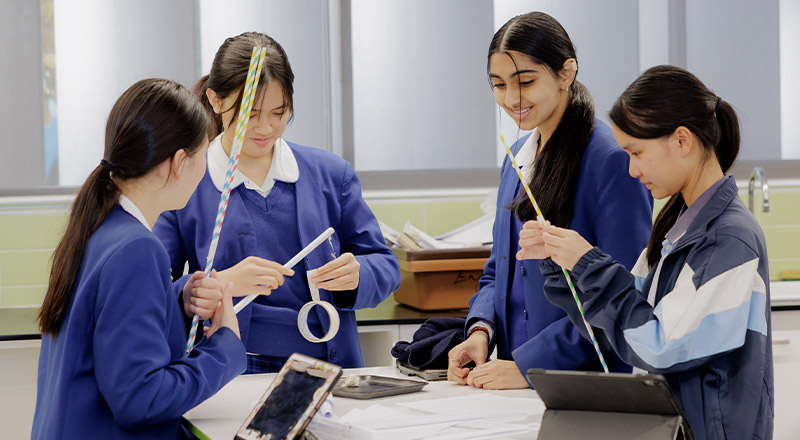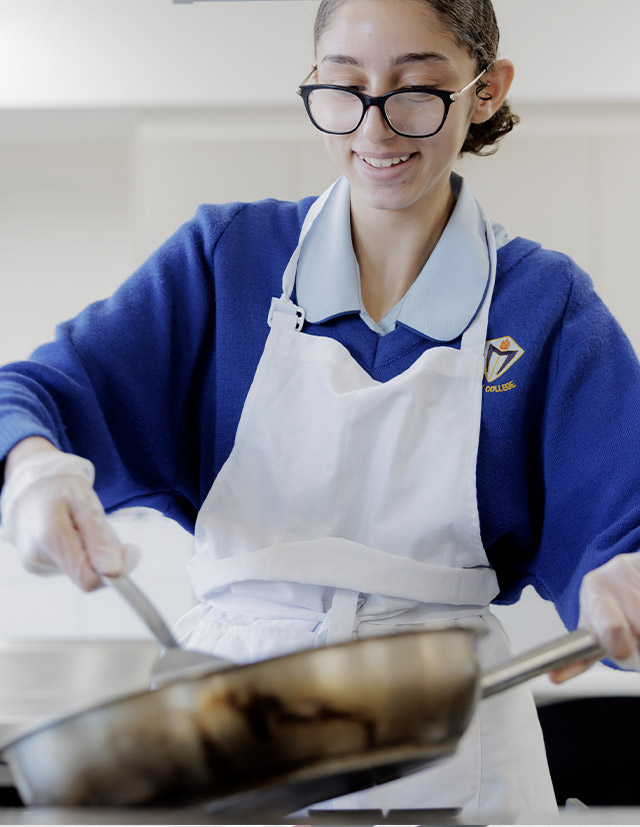Cerdon has a number of school-based policies and procedures that govern various aspects of our school life.
Catholic Schools Parramatta Diocese (CSPD), also provides advice and recommendations on educational and administrative policies and priorities, and monitors policy implementation.



Policies and Procedures
-
Governance Risk and Compliance
Modern Slavery Statement
CSPD's Modern Slavery statement focuses on confronting modern slavery and ensure that our supply chains respect the dignity and value of each person.Whistleblower Policy
The purpose of this policy is to encourage reporting of corrupt conduct, maladministration and serious and substantial wrongdoing without fear of reprisal or detrimental treatment.Health and Safety
Work Health and Safety Policy
Workplace Health and Safety PolicyPrivacy Records and Information Management
Alumni Collection Notice
This wording on this Collection Form can be used for School Alumni Associations with reference to CSPD Privacy Policy (Updated 2023)Employment Collection Notice
This notice outlines what information CSPD collects and stores when you apply for employment with us, and who we disclose that information to.Information Sharing Policy
The Information Policy sets out how Catholic Schools Parramatta Diocese (CSPD), its schools and related services obtain and release personal information from and to third partiesPrivacy Policy
This Policy sets out how the CSPD manages the personal and sensitive information we collect and hold. (updated Jan 2023)Standard Collection Notice
The Standard Collection Notice outlines the types of personal information, including sensitive information about students, parents or guardians, and how that information is used. (updated logo 2023)Volunteer and Contractor Collection Notice
In applying to provide your services you will be providing our schools, Catholic Early Learning Centres (CELCs), Catholic Out of School Hours Care services (COSHCs) and offices with personal information (Updated 2023)Professional Learning
Accreditation to Work Teach and Lead in CSPD
This Policy sets out how CSPD will classify and manage the accreditation of all teaching, non-teaching and CSPD staff.Safeguarding
Code of Conduct when Working with Children and Students
This Code of Conduct is to inform staff members of CSPD of the standards of behaviour and other requirements that must be adhered to when working in an organisation which delivers services to children and studentsSafeguarding Procedures
This document outlines the procedures that must be followed by staff members when responding to concerns relating to children and young persons and any alleged breach of the CSPD Code of Conduct When Working With Children and Students.Working with Children Check
CSPD has in place a variety of strategies to ensure child safe schools and communities are maintained including the obligation for all staff members undertaking child-related work to hold a valid NSW Working with Children Check clearance.School Community
Complaint Management Procedure
The objectives of this document is to provide information on raising a complaint.Enrolment Policy
This Policy provides information about the enrolment principles, enrolment criteria and procedures for Parents/Carers seeking to enrol a child into a CSPD School.Family and School Partnership Principles
CSPD and its schools, value parents and carers as partners and this partnership is critical in supporting each child to achieve their best throughout their learning and faith journey.Research Application Guidelines
These guidelines are designed to support potential external researchers, and researchers internal to CSPD, to make sound decisions about their research application.School Fees Policy
The purpose of this Policy is to ensure fair and equitable school fee assistance and collection processes across all schools in the Diocese of Parramatta.Walking Together Framework
This foundational document outlines a frame of reference for how we can respond to both instructive and formative discussion of the shared mission of parish and school communities.Staff
Code of Conduct Policy
This document sets out the obligations, responsibilities and standards of behaviour Catholic Schools Parramatta Diocese (CSPD) requires of its staff members.Preventing Discrimination Harassment and Bullying Policy
Preventing Discrimination Harassment and Bullying Policy.pdfStudents
Banned Substances Student Procedure
This Procedure covers the possession, use and distribution of alcohol, tobacco, vaping devices, illegal drugs or other banned substances. (Updated Feb 2023)Bullying Prevention and Response Procedure
The purpose of this procedure is to prevent bullying through the creation of safe, respectful & supportive school cultures & responding to bullying behaviour in ways that are just & effective, with a focus on safety, restoring relationships.Externally Funded Therapy and Allied Health Providers in Schools Policy
This document provides information around externally funded therapy for students and Allied Health providers in school.Guidelines for Supervising University Student Placement
These guidelines apply to all university students who have been accepted into a professional experience placement at a CSPD school in the fields of social work and psychology.Student Attendance Policy
Central to championing diversity and equity is our commitment towards the attendance of all students. This Policy sets out the requirements for all staff managing, recording, reporting and monitoring student attendance at CSPD schools.Student Behaviour Policy
The focus of this policy is to define the behaviour expectations of students and to assert everyone’s right to a safe, inclusive, respectful learning and working environment.Student Use of Digital Devices and Online Services Policy
Student Use of Digital Devices and Online Services Policy.pdfStudent Use of Mobile Phones and other Digital Devices at School Policy
This Policy provides direction and advice to all CSPD schools on managing student use of mobile phones and wearable tech while they are at school.Student Wellbeing Framework
The framework is made up of five strategies which enhance the school-wide focus on student wellbeing, safety and welcome for students of CSPD.Student Wellbeing Policy
This Policy states that principles followed when making decision about students. It is based on an acknowledgement that parents and carers are the first and most important educators of their children.Student exemption procedures
These procedures outline the conditions upon which a child may be exempt from being enrolled at and attending school (Implemented 2017)Suspension, Transfer and Exclusion Procedure
CSPD is committed to developing an educational and organisational culture based on mutual trust and respect that assists people to recognise and develop their personal capabilities.Weapons Procedures
CSPD is committed to ensuring that all its sites are places of safety for students, staff and other persons attending those places.
Have a question about Cerdon College?
Call us today. We'll be happy to chat to you!
Our Story
We are committed to excellence in learning and teaching.
Our Difference
At Cerdon, we use innovative and personalised learning to connect students with ‘real world’ opportunities.
Our Commitment
Our students are treated with dignity and respect. Their safety and wellbeing are our top priorities.

